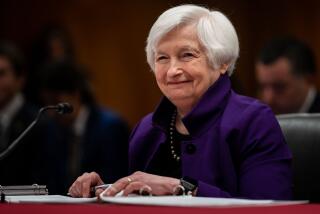Friends Help Buy Time for U.S. Economy
- Share via
A sophisticated investment banker paused in the middle of lunch last week and asked, “Was there a stock market crash last October?”
He was only half joking. Of course there was a crash--with U.S. stocks losing hundreds of billions of dollars in value and leading a drastic slide in stock markets around the world. The crash sparked concern that we were seeing a rerun of 1929 and that a 1930s-style Depression would follow.
But today, six months later, we are not seeing a depression--nor even a declining stock market. U.S. stocks are selling at their post-crash highs--the Dow Jones industrial index closed above 2,100 on Tuesday--and markets in other countries are doing even better.
What’s behind the good news? A fine example of international cooperation that, if it continues, offers hope that the world can avoid the economic devastation it suffered in the 1930s.
Much Greater Holdings
Specifically, world markets are doing well--and the U.S. economy and those of other nations are prospering--because foreign countries have been supporting the value of the U.S. dollar. Foreign nations do that when their government banks buy and hold U.S. dollars or Treasury securities as part of their official reserves.
And they have been doing that on a grand scale. For example, Britain held $39 billion of U.S. currency and securities in its reserves as of this January, compared to $19 billion a year ago. Japan held $83 billion, compared to $52 billion; West Germany held $76 billion, compared to $62 billion. Even smaller countries did their bit, with Spain doubling its dollar holdings to $30 billion from $15 billion.
How does that help the American economy? The way a loan until payday helps an individual. When foreign central banks buy Treasury securities, they finance the U.S. government deficit, leaving money free for our economy to use. Federal Reserve Board Governor H. Robert Heller acknowledged in a speech last week that foreign capital is meeting “the credit needs of the federal government.” That’s why there’s enough money for consumers to buy houses at reasonable mortgage rates and for business to finance expansions. As the Beatles used to say, we’re getting by with a little help from our friends.
To be sure, those friends help for their own reasons. Foreign countries know that if the dollar declines further, their products will become more expensive and lose out in the U.S. market--while more U.S. exports would surge into their home markets. The buildup to a $150-billion trade deficit hurt U.S. farmers and manufacturers; the swift reversal of it would hurt foreign farmers and manufacturers. So their governments try to keep the dollar at its present value.
Came as Surprise
Meanwhile, explains Byron R. Wien, a managing director of Morgan Stanley, as foreign central banks pay out Japanese yen and West German marks to buy dollars, they often increase their own money supply. And that increased availability of money is fueling the rise of stock markets around the world.
So it’s a happy time. “We’re all surprised at how well the economy has done following the crash,” says Karl Matthies, chief of research at San Francisco’s Montgomery Securities. And the outlook is good, says the Fed’s Heller, with as yet no sign of increasing inflation.
But we should not forget that relying on the kindness of foreigners is a temporary solution. Basically, the foreign central bankers are buying time for the United States to tighten its belt, reduce its deficits and repay its loans. Meanwhile, the quid pro quo for foreign support is that the U.S. Fed keep interest rates high enough and money supply tight enough to prevent inflation.
Thus, you could say that its debtor status has reduced U.S. freedom of action and made it vulnerable to foreigners pulling back their investments.
But another perspective is more useful: Why not see vulnerability as a two-way street? If foreign nations buy U.S. currency and government securities, don’t they have to fear U.S. inflation cheapening the value of the paper they are holding? Isn’t the commitment mutual?
Of course it is. And that’s as it should be. For back in the 1930s, after the 1929 stock market crash, each nation went its separate way, competitively devaluing its currency and following policies called “beggar-thy-neighbor.” They didn’t work. The world’s economies suffered severe depression--the United States most of all--because of that lack of cooperation.
So, as the finance ministers and central bank governors of the seven major industrial nations--Japan, West Germany, Britain, France, Italy, Canada and the United States (to be represented by Treasury Secretary James A. Baker III and Federal Reserve Chairman Alan Greenspan)--meet today in Washington to further define and affirm their cooperative policies, we should watch the doughnut not the hole. Yes, there most certainly was a crash of the over-inflated stock market last October, just as there was a crash in October, 1929. But this time the aftermath has a chance to be different. It’s a hopeful sign for the world economy.
More to Read
Inside the business of entertainment
The Wide Shot brings you news, analysis and insights on everything from streaming wars to production — and what it all means for the future.
You may occasionally receive promotional content from the Los Angeles Times.










